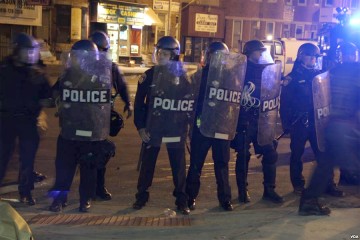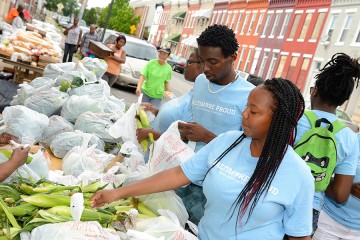A year after the unrest in Baltimore sparked by the arrest and death of Freddie Gray, Johns Hopkins University is launching an art and conversation series to reflect on deep-rooted discrimination in the city and what the community can do about it.
The series of four events, called Redlining Baltimore, will bring together academics, activists, civic leaders, residents, and local artists and musicians to engage in conversations about what the legacies of discrimination and segregation mean to the future of opportunity and inclusion in the city.
The name of the series refers to the historical practice of denying services—health care, mortgage loans, even access to supermarkets—to residents in certain areas based on the racial or ethnic makeup of those areas.
"What happened last April has deep roots going back decades through government sanctioned policies like redlining," said Ben Seigel, executive director of the university's 21st Century Cities Initiative, which is sponsoring the series. "The goal of the Redlining series is to bring together parts of Baltimore that might not ordinarily interact and to have a conversation about this uncomfortable legacy of our city's history and how we can work together as individuals and institutions to overcome it once and for all."
Actress and activist Sonja Sohn—best known for her role as Detective Kima Greggs on the HBO drama The Wire—will host each session.
All events start at 6 p.m. and are free and open to the public. Anyone interested in attending is encouraged to register in advance online.
The four scheduled events are:
Legacy: Living and Coming of Age Inside the Redline, April 6 at the Motor House, 120 W. North Ave. Speakers include Antero Pietila, author of Not in My Neighborhood: How Bigotry Shaped a Great American City; Johns Hopkins sociologist Stefanie DeLuca; Kenny Liner, founder of Believe in Music; Chris Wilson, founder of companies that hire ex-offenders; Joe Jones, founder of the Center For Urban Families; and Makayla Gilliam-Price, a Baltimore high school student and City Bloc organizer.
Experience: Public Health and the Redline, April 13 at the Reginald Lewis Museum, 830 E. Pratt St. Speakers include Debra Furr-Holden, deputy director of the Johns Hopkins Center for the Prevention of Youth Violence; Lawrence Brown, Morgan State University assistant professor in the School of Community Health & Policy; Richard Best, founder of the urban art nonprofit Section 1 Inc.; and Sonia Sarkar, chief policy and engagement officer for the Baltimore City Health Department .
Opportunity: Inclusive Development and Wealth Creation Inside the Redline, April 20 at The Jewish Museum, 15 Lloyd St. Speakers include Rodney Foxworth, the founder of Invested Impact, a nonprofit that helps underrepresented entrepreneurs; Johns Hopkins Carey Business School professor Lindsay Thompson; Diane Bell-McKoy, president and chief executive officer of Associated Black Charities; and Elisabeth Sachs, executive director of the Job Opportunities Task Force.
Transform: The Future of Justice and Knowledge of the Redline, May 4 at Parks and People Foundation, 2100 Liberty Heights Ave. Speakers include Johns Hopkins political scientist Lester Spence; radio show host Marc Steiner; and Michael Cryor, chairman of OneBaltimore.
A number of performers have been commissioned to create music for the series. Artists who will perform original works at the events include Gary Thomas, director and Chair of Jazz Studies at JHU's Peabody Institute; jazz trumpeter Dontae Winslow, a West Baltimore native and Peabody graduate; Believe in Music, a program for underprivileges city students; jazz saxophonist Jarrett Gilgore, a Peabody alum; and Eze Jackson, a Baltimore-based hip-hop artist.
Artwork will be on display at each event made by street artists and muralists Gaia, Nether, and Earnest Shaw.
"We want to get people talking about what policies of exclusion have looked like, how they persist today, and what we can do about them to transform the future," said Elizabeth Talbert, associate director of the 21st Century Cities Initiative.
Posted in Politics+Society
Tagged baltimore, race relations, 21st century cities, baltimore unrest









